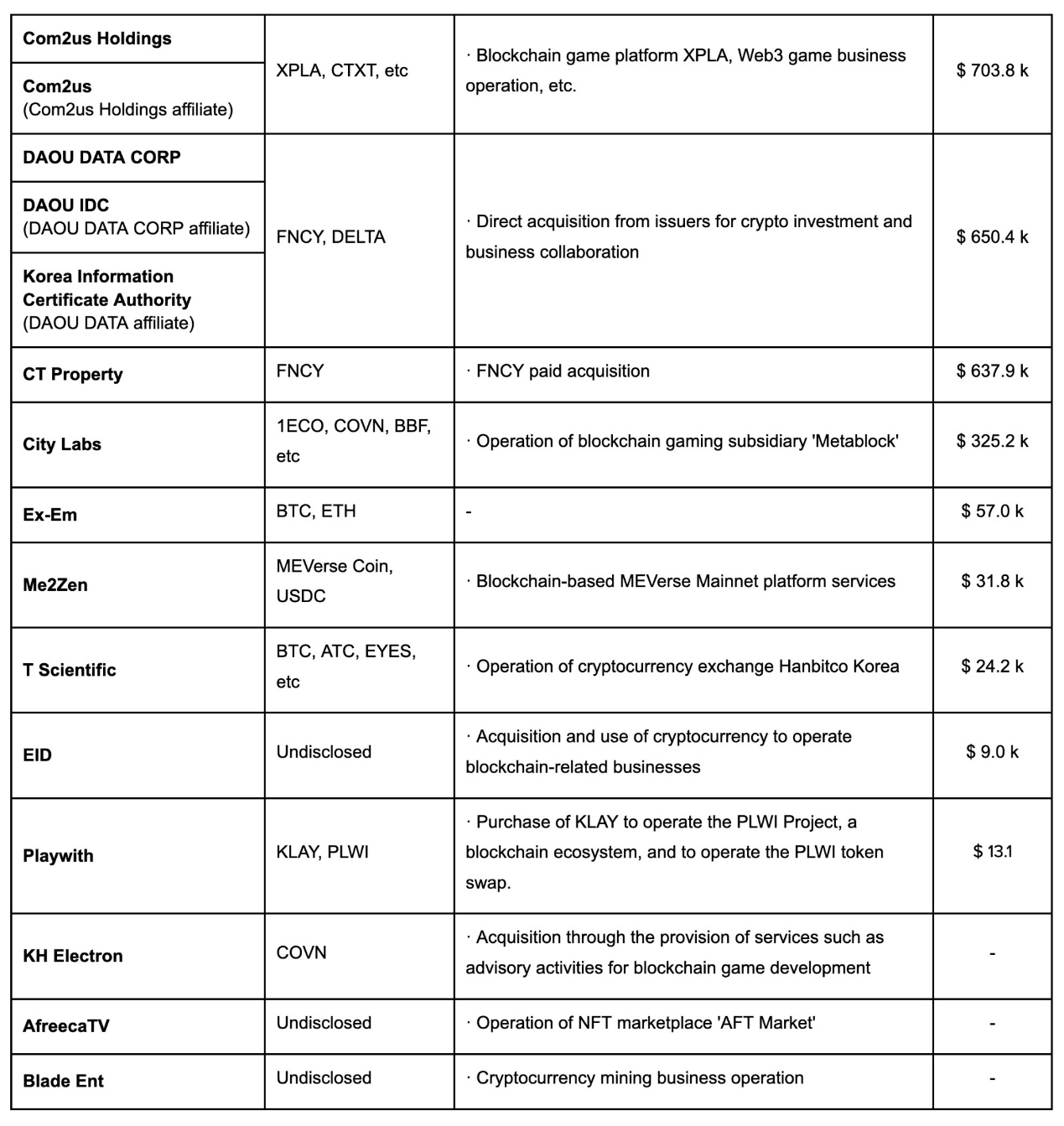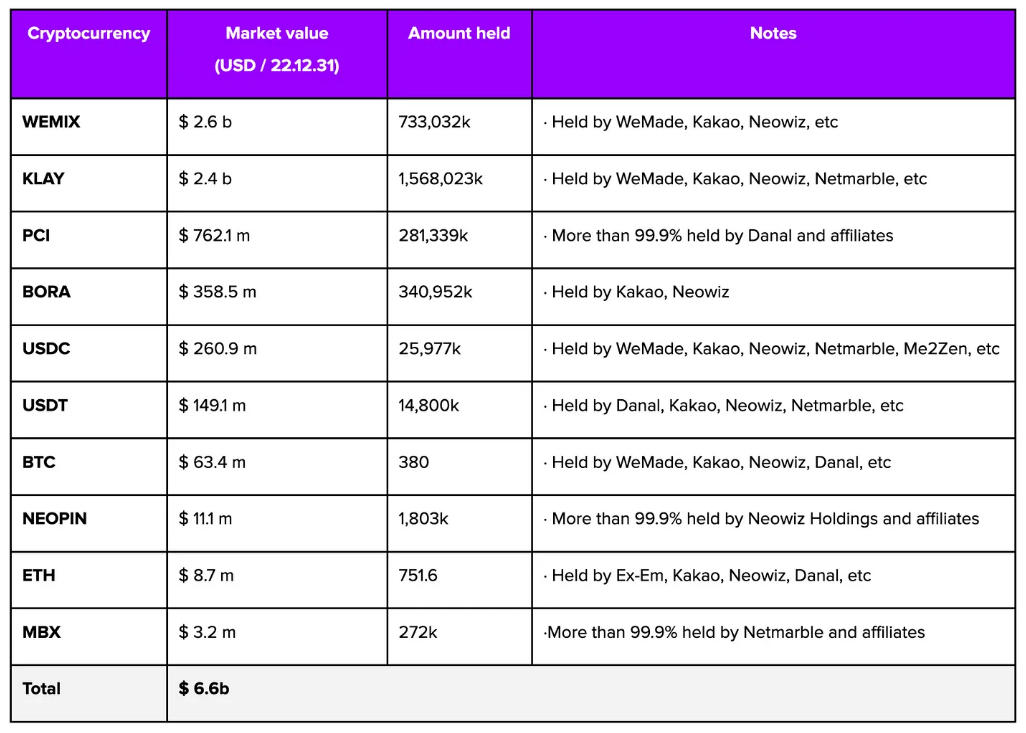Data Interpretation: 37 listed companies in South Korea hold approximately 160 million USD in cryptocurrency assets, which tokens are "preferred"
Authors: Jay Jo & Yoon Lee
Original Title: 《Korean Enterprises: A Deep Dive into Their Cryptocurrency Holdings》
Compiled by: Felix, PANews
TL; DR
Despite the continuous decline of the South Korean cryptocurrency market, the cryptocurrency holdings of enterprises have increased. In fact, 37 listed companies hold cryptocurrency assets worth 201 billion KRW (approximately 160 million USD).
The largest proportion of these companies directly issue cryptocurrencies for operations related to cryptocurrency businesses. They also hold assets such as stablecoins as investment reserves, or purchase BTC and ETH for investment purposes.
In the future, the disclosure of information by companies holding cryptocurrency assets will become mandatory, and a more transparent and secure investment environment is expected.
Introduction
While the South Korean cryptocurrency market continues to decline, the amount of cryptocurrency held by enterprises is on the rise. In fact, according to a survey by the Financial Services Commission, as of June 2022, a total of 37 domestic listed companies had acquired and held cryptocurrency assets. Furthermore, the market value of the third-party issued cryptocurrency held by these companies is estimated to be around 201 billion KRW (approximately 160 million USD). These findings indicate that South Korean companies are expanding their cryptocurrency-related businesses and actively investing in the market.
 Virtual asset holdings of South Korean listed companies (third-party issued tokens), Source: Financial Services Commission
Virtual asset holdings of South Korean listed companies (third-party issued tokens), Source: Financial Services Commission
Current Status of Cryptocurrency Holdings by South Korean Listed Companies
The Financial Services Commission's "2022 Survey on Cryptocurrency Holdings of Domestic Listed Companies" did not disclose detailed company names, making it difficult to determine which companies hold cryptocurrency. Through independent research, it was found that as of December 2022, several listed companies held cryptocurrency assets. Most of these are gaming companies such as Neowiz, WeMade, and Netmarble, or companies like Danal and GalaxiaMoneyTree that operate payment settlement businesses. The amount of virtual assets held is also quite substantial. Their paths to acquiring cryptocurrency are as follows (Note: The Financial Services Commission's "2022 Survey on Cryptocurrency Holdings of Domestic Listed Companies" is based on data as of June 2022, while the author's research is based on confirmed financial statements of listed companies as of December 2022, so the overall cryptocurrency holdings may differ):
- Paid Acquisition: Acquiring cryptocurrency through exchanges, ICOs, private placements, etc.
- Free Acquisition: Acquiring cryptocurrency through self-developed cryptocurrencies, airdrops, etc.
- Exchange Acquisition: Acquiring virtual assets by exchanging third-party issued tokens with company-issued and held tokens.
- Providing Services: Acquiring virtual assets through providing consulting and development services (participating as members of various foundation governance committees and node validators).
- Mining Rewards: Directly acquiring virtual assets through operating virtual asset mining businesses, staking services, etc.
Thus, listed companies acquire and hold cryptocurrency assets through various means, primarily by directly issuing cryptocurrency through overseas subsidiaries to operate cryptocurrency-related businesses.

 Cryptocurrency holdings of 29 listed companies in South Korea (excluding self-issued), Source: Various companies
Cryptocurrency holdings of 29 listed companies in South Korea (excluding self-issued), Source: Various companies
Types of Cryptocurrencies Held by South Korean Listed Companies
The top 10 cryptocurrencies held by South Korean listed companies are as follows. These companies mainly have the following three characteristics:
They directly issue or purchase cryptocurrencies to conduct their own blockchain businesses, with the largest proportion of holdings being blockchain game-related cryptocurrencies such as WEMIX, BORA, and NEOPIN, primarily issued in South Korea.
Approximately 51.7 billion KRW (around 39.8 million USD) is invested in stablecoins such as USDC and USDT. These funds are either used as backup funds for financing blockchain projects through ICOs or for marketing and commission purposes.
Cases of purchasing major cryptocurrencies such as Bitcoin and Ethereum for investment purposes have also been identified.

Types of Cryptocurrencies Held by Private Companies
It has been confirmed that private companies also acquire and hold virtual assets and transparently disclose them through annual audit reports. These mainly include companies such as Dunamu, Bithumb, Coinone, Cobit, and Gopax (Streamy) that operate virtual asset trading businesses. Additionally, some enterprises have obtained a certain amount of cryptocurrency by logging into Web3 games on platforms such as Gurobal Games and XL Games. Cryptocurrency investment companies like Uprise hold cryptocurrencies as investment assets, such as Bitcoin or Ethereum. Even among private companies, cryptocurrency assets are primarily held by companies that operate or plan to operate cryptocurrency-related businesses, such as gaming companies, investment firms, and IT-related companies. Furthermore, even if they do not directly operate cryptocurrency-related businesses, there are cases of acquiring cryptocurrencies by participating as validators in the Klaytn and XPLA mainnets.
Conclusion
Many South Korean companies are acquiring and holding virtual assets and are attempting to disclose these assets through information transparency. Despite these efforts, many companies still face difficulties due to the ambiguity of current virtual asset accounting standards.
Moreover, the disclosure of virtual asset holdings is not yet mandatory. Many enterprises have not publicly disclosed their virtual asset holdings or have not clarified the means of acquiring virtual assets, which adds to investor confusion. However, starting next year, a new regulation will be established requiring cryptocurrency asset holders to disclose the following information. From that point on, listed companies will be able to disclose their cryptocurrency holdings more transparently and create a safer investment environment. The information expected to be disclosed includes:
- General information about virtual assets (name, characteristics, quantity, etc.)
- Accounting policies applicable to virtual assets (account classification, cost and revaluation models, etc.)
- Information on the acquisition methods, acquisition costs, book value, market value, etc. of virtual assets
- Information on the calculation of virtual asset market value (exchange name, calculation time, etc.) and price volatility risks
- Information on the nature of risks associated with holding virtual assets










